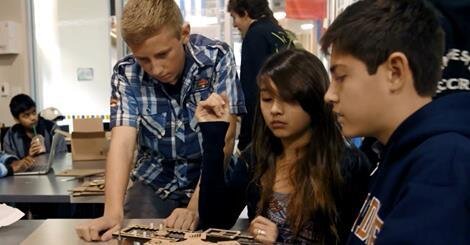Teaching Kids for Tomorrow
“If we teach today as we taught yesterday,
we rob our children of tomorrow.”
— John Dewey, educator and philosopher
What if I told you that there is a school model that works? A school model that puts students in the driver’s seat.
This new model is a strong educational framework, created by intelligent, passionate, committed teachers, that centers on making learning relevant and engaging. It teaches thinking skills and character traits, like resilience and persistence. It makes students creative and entrepreneurial.
There’s just one catch. This school is very different from the kind of school you or I went to.
It does not fill a child’s mind with facts. It does not teach a sequence of topics laid out by a pre-defined curriculum. It makes learning joyful, connected and relevant to the times we live in.
Would you take a leap and consider such an education for your child or the children you teach?
This may be the only way children will thrive our fast-changing world. Still, it is hard, so hard to let go of our need for quantifiable results, a track to college and an education that teaches all the “basic skills and content”.
It is a leap we must take. But how?
Most Likely to Succeed, an acclaimed Sundance documentary tells the story of a new school model that works and invites all of us to ask how we might effect courageous change in our schools.
Consider these questions:
1. What skills did you learn in school that you use in your life today?
2. What content/knowledge did you acquire at school that you still use today (other than while helping your child with her homework)?
3. What do you wish you had learned in school that would make your daily life/job better?
Join us for Puget Sound’s debut screening of Most Likely to Succeed and a panel discussion with local education innovators. Details here
Thursday May 28th, 7pm at romp — a modern play space in Bellevue
Image provided by: Most Likely To Succeed



